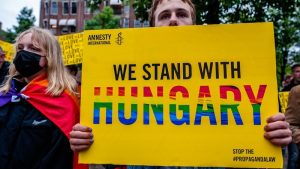By guest contributor, Akshita Tiwary*
Recently, Hungary has been in the news for adopting a slew of legislation in the past year that severely curbs the rights of the LGBTQ community. The Prime Minister of the country, Mr. Viktor Orban, and his right-wing political party ‘Fidesz’ have been accused of eroding democracy on several fronts, including attacking LGBTQ rights. This article aims to discuss three of these legislations and highlight how these laws contradict Hungary’s own Constitution and violate international human rights legal standards. Further, it also sheds light on certain legal precedents and measures that can be helpful in tackling this issue.
THE CONTROVERSIAL LAWS

On June 15, 2021, the National Assembly of Hungary passed Bill Number T/16365. This law prohibits children under 18 years of age from being exposed to any content (educational or otherwise) that promotes an understanding of sexual and gender diversity. This bill forms part of a broader law that seeks to restrict pedophilia and sexual crimes against children. However, under the guise of protecting children, this legislation focuses on preventing minors from gaining an idea about homosexuality and gender reassignment so as to not harm their psychological development at a tender age. To this effect, the bill seeks to amend other laws which ensures that any content/advertisements that display homosexuality or deviate from a traditional understanding of ‘gender’ as “sex assigned at birth”, is banned for children under 18 years of age. This bill has come under fire from international organisations like Human Rights Watch for stigmatizing the LGBTQ community in the eyes of minors.
On December 15, 2020, the Hungarian Parliament adopted the Ninth Amendment to the Hungarian Constitution in the form of Bill Number T/13647. This amendment sought to provide a “traditional” definition of family which is “based on marriage and a parent-child relationship, where a mother is a woman, and a father is a man”. A related law was passed with this amendment, which effectively nullified adoption by same-sex couples. Even though gay marriage is not recognised in Hungary, adoption by same-sex couples was still possible if one of the partners applied as a single person. Now after the passing of the law, even this option is not available for queer partners since they do not fit within the traditional notion of a family. Apart from this, the bill also seeks to “protect the right of children to self-identify with their sex assigned at birth and to have an upbringing according to the constitutional identity and Christian culture of the country”. All these features clearly characterize the laws as ‘discriminatory, homophobic and transphobic’ pieces of legislation that attack the rights of the LGBTQ community.
Finally, in May 2020, Bill Number T/9934 was passed in Hungary, which invalidates the legal recognition granted to transgender, intersex, and non-binary citizens within the nation. This law defines gender as “sex assigned at birth”, and prevents individuals from altering their names and genders on official documents like identity cards and marriage certificates. Once a particular sex is recorded for a person at birth, it cannot be changed. Such legislation promotes transphobia and violates important rights guaranteed to transgender individuals.
VIOLATION OF CONSTITUTIONAL VALUES AND INTERNATIONAL HUMAN RIGHTS LAW STANDARDS

These recent laws violate essential human rights of the LGBTQ community in Hungary. Most of these rights are grounded in the Hungarian Constitution and in international human rights law conventions like the International Covenant on Civil and Political Rights (“ICCPR”), the International Covenant on Economic, Social and Cultural Rights (“ICESCR”) and the European Convention on Human Rights (“ECHR”).
The Hungarian Constitution guarantees that it shall be the constitutional obligation of the state to protect the inalienable fundamental rights of man (Article I). Article II assures that the human dignity of each individual shall be inviolable. The right to privacy is specified in Article VI, and the right to freedom of expression is affirmed by Article IX. Most importantly, Article XV(2) preserves the right of people to not be discriminated against on the basis of their sex.
Hungary has ratified the ICCPR, ICESCR and ECHR. Hence, it is bound to observe the right to privacy (ICCPR Article 17; ECHR Article 8), the right to freedom of expression (ICCPR Article 19; ECHR Article 10) and the right to non-discrimination on the basis of sex (ICCPR Article 26; ECHR Article 14). It is also obligated to ensure that individuals enjoy the right to family on their own terms (ICESCR Article 10).
All three laws passed in Hungary violate the right to non-discrimination by targeting only the LGBTQ community. Bill Number T/16365 proclaims that exposure of children to sexual and gender diversity can be corruptive. It contravenes their right to freedom of expression by restricting open discourses on sexual orientation and gender identity for fear of ‘brainwashing minors’. Bill Number T/13647, and the related law, violate the right to family life of homosexual couples by prohibiting them from adopting children. By refusing to accord legal recognition to transgender and intersex citizens, Bill Number T/9934 violates their right to privacy, self-identity, and personal autonomy. Therefore, all these laws infringe upon the right to human dignity of LGBTQ individuals.
THE WAY FORWARD

International law, including UN resolutions and the Yogyakarta principles, already proposes an end to discriminatory laws and practices against the LGBTQ community (some of which have been supported by Hungary too). Cases adjudicated by the European Court of Human Rights (“the Court”) reflect the same. Just two months after the passing of Bill Number T/9934, the Court ruled in the case of Rana v. Hungary that Hungary’s refusal to officially change the name and sex marker of an Iranian transgender refugee defied his right to private life under the ECHR. In E. B. v. France, the Court held that refusing the applicant’s request to adopt on the basis of her homosexuality breached her rights to non-discrimination, privacy, and family life. Further, in Bayev and Others v. Russia, where Russia had passed a series of legislative acts banning the promotion of homosexuality among minors, the Court found interference with Articles 10 and 14 of the ECHR on the grounds that such laws were arbitrary and reinforced homophobia which served no legitimate interest in a democratic society.
While the entire international community has denounced these Hungarian laws, the European Union (“EU”) stands primary amongst these critics. The bloc, in response to the growth of the anti-LGBTQ wave in Hungary and Poland, has taken steps like classifying homophobic speech as hate crimes on a list of “EU crimes” and adopting proposals to protect same-sex families. The Council of Europe has adopted resolutions protecting the LGBTQ people, while the European Parliament has declared the EU an ‘LGBTIQ freedom zone’. EU leaders have also recently signed a joint letter defending the rights of the LGBTQ community.
Hopefully, all these measures can create sufficient international pressure to derail the Hungarian government from encroaching upon the rights of the LGBTQ community. If not, then the European Commission can file a legal case against Hungary at the European Court of Justice, or freeze funding for the nation for undermining the rule of law. The EU has already begun an investigation against the country for subverting democratic standards. Comprehensively employing all these techniques appears to be the only way in which Hungary can be persuaded to reverse its stance on this important international issue.
* Akshita Tiwary is a 4th year student at Government Law College, Mumbai in India. She is highly interested in international human rights law and also serves as the Co-Managing Editor of JURIST Commentary Service
Photos
“A man holds a placard during a demonstration against Hungary’s Anti-LGBT Law in Amsterdam” RTE, 2021
“Viktor Orbán” by More pictures and videos: [email protected] is licensed under CC BY 2.0
“Budapest Pride parade” by Joost (formerly habeebee) is licensed under CC BY-NC-ND 2.0
